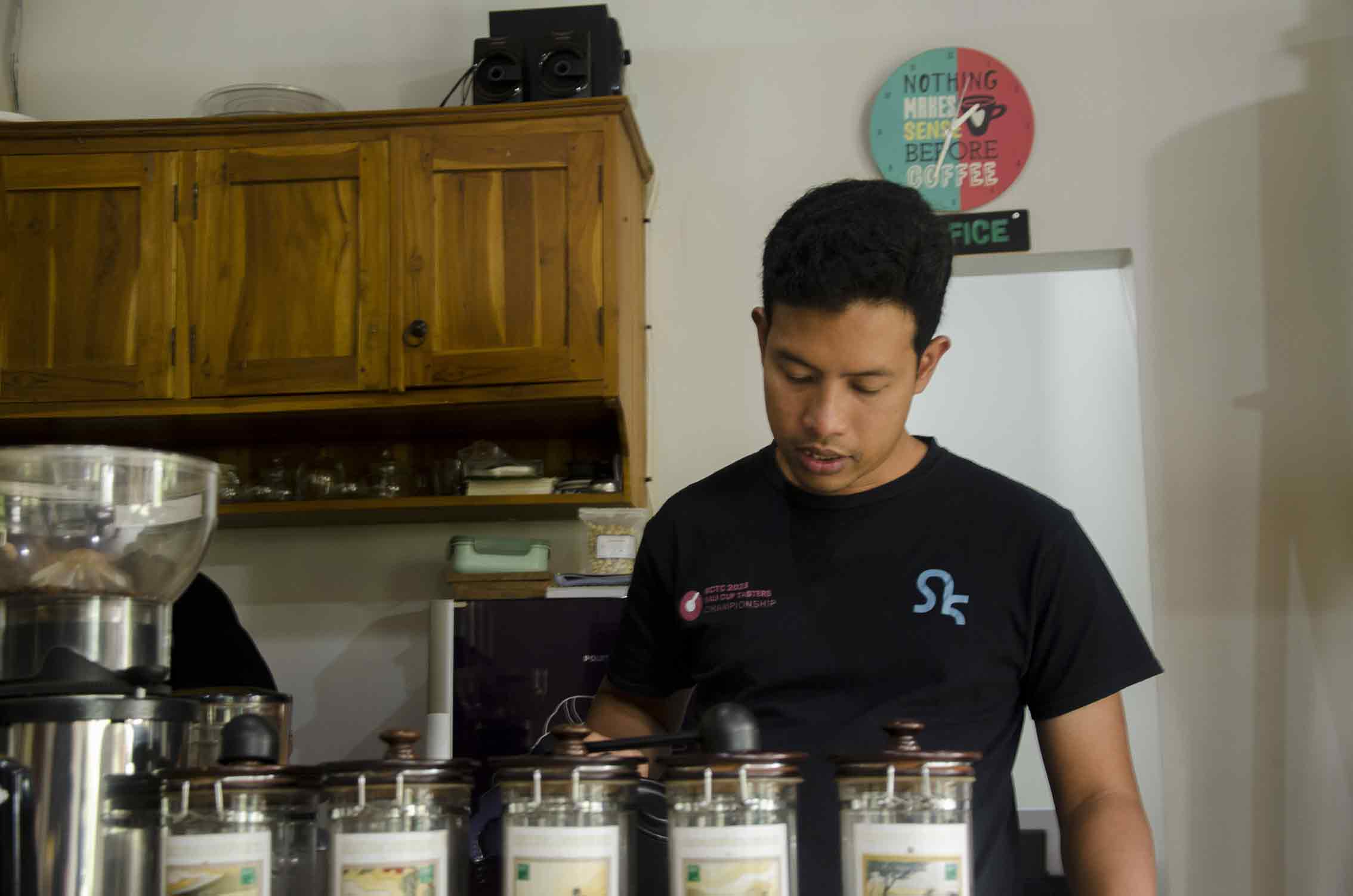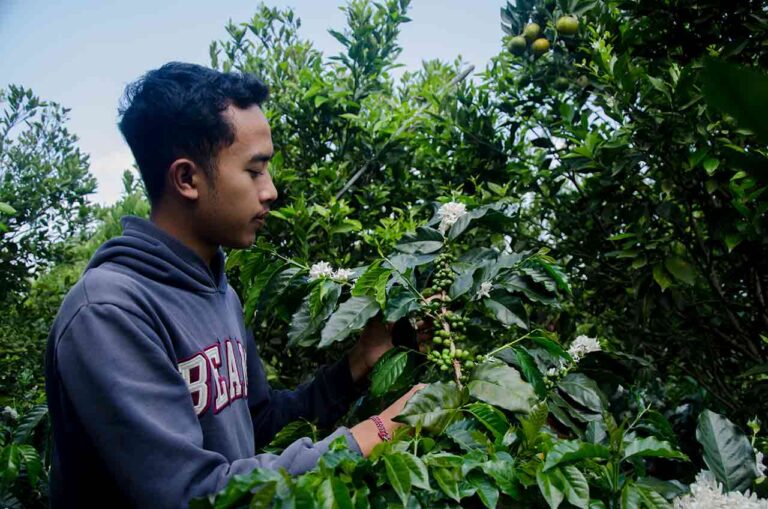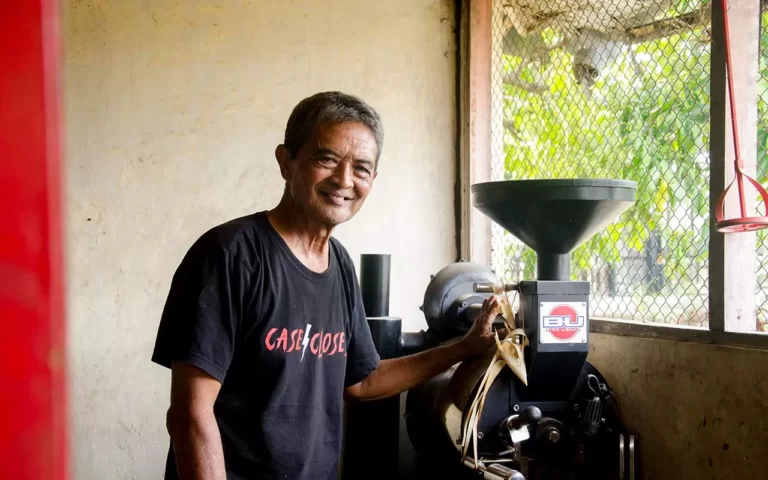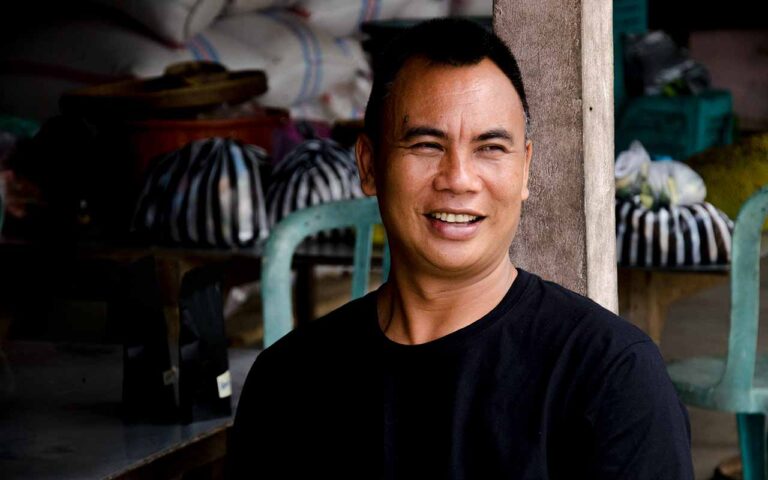Arya Giri’s gaze was fixed on the tiny roasting machine on the table that was working. The gurgling sound of coffee beans running like squirrels rolling a toy jogging wheel did not escape his auditory alertness.
“We are roasting a sample of green beans that we are processing for the first time,” he said.
This is the workspace of Arya Giri, a coffee processor at Munduk Coffee, not far from Lake Tamblingan, Bangli.
A large, black roasting machine fills the corner of the room. The Froco brand machine has a capacity of 18 kg in one roasting process. The large machine is not operating.
Next to it is a small office room, apparently where the administrative staff does the recording.
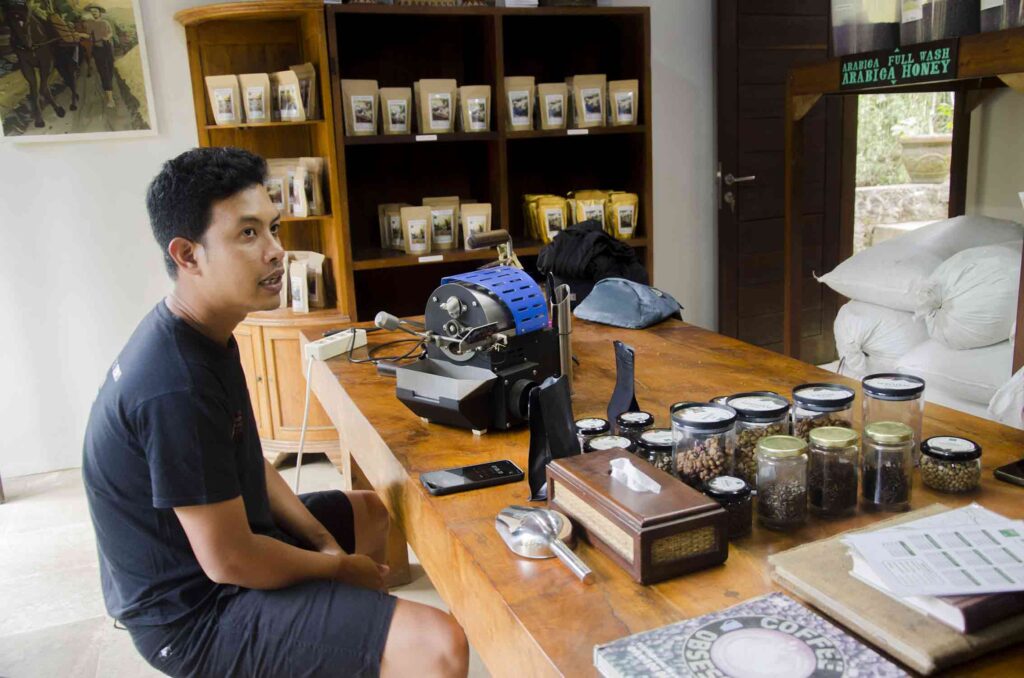
The bar houses a grinder and a number of pieces of coffee equipment, facing a natural brown square table made of thick solid wood and surrounded by small chairs. That’s where Arya Giri roasts his new green bean samples with a roasting machine borrowed from Candikuning Coffee Farm, a partner coffee plantation located near Lake Baratan.
A large two-story rack is filled with sacks of green beans on the bottom and containers filled with roasted beans on the top.
Across from it, a wooden shelf is sweetly lined with various brewing equipment as decorations, along with posters about coffee. When entering this room, it feels like being hugged by the warmth and fragrance of Arabica.
Arya Giri removes the sampling spoon from the roasting machine that is still working. Observing the color and smelling the fragrance of the coffee beans that are starting to darken. Immediately putting it back into the roasting drum, followed by his fingers playing with the panels on the machine.
“The fun of sampling roasting is to find out how our green beans are processed, whether it is equivalent to the complexity of processing, or whether the coffee profile is far from expectations,” he said while still keeping an eye on the work of his roasting machine.
According to him, the failure of green bean processing this year can only be repeated in the coming year. Because the coffee harvest is only once a year. That is the challenge that he considers fun.
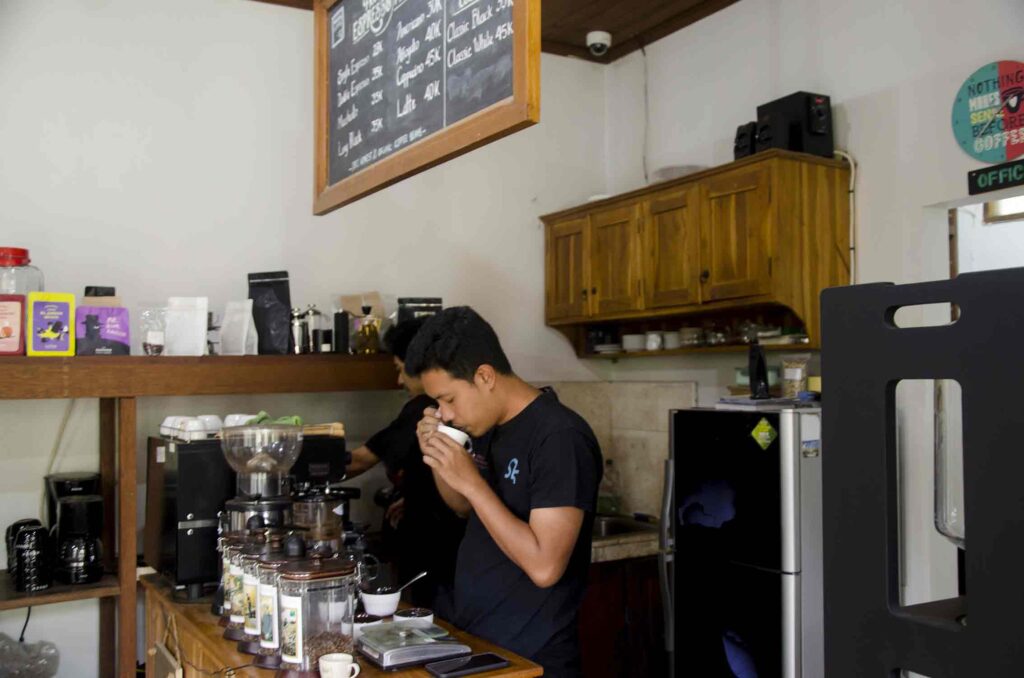
Munduk Coffee not only processes coffee from its own harvest but also collects the harvest from 100 coffee farmers in Asah Gobleg, Munduk, and the surrounding villages. Because the two hectares of its plantation are not all planted with coffee but are also interspersed with several resort buildings.
Processing coffee harvested from various farmers has its own challenges. Because each farmer has different conditions and situations in the plantation.
“We can’t be selfish and only demand perfect quality coffee harvests,” he said, while completing the roasting process of his coffee samples and starting the cooling of the roasted beans.
Sometimes farmers cannot harvest coffee yields by only selecting ripe red cherries because the conditions of the plantation are steep and slippery. Harvesting coffee is quite risky. Harvesting several times certainly has implications for the high cost of harvesting.
Sometimes there are farmers who can only employ coffee pickers who are old ladies. The harvest results are not uniform. We must understand,” he said.
Arya Giri needs to provide special treatment for coffee cherries that are not harvested uniformly. For example, by doing more accurate sorting, it can still produce good coffee.
At this point, Arya Giri chose to suppress his ego and side with the farmers, who are often not in an ideal situation.
Immediately from the direction of the bar table, a brew of Munduk coffee with a classic natural process slid.
“Now, try our classic natural fermentation results,” he said invitingly.
A small ceramic cup with a warm brew of coffee is ready to be sipped. The aroma is sweet caramel and sugarcane.
When sipping and swallowing the coffee, the sweet taste of pomegranate is quite intense, giving a strong accent to the comfortable citric taste of orange, like most Kintamani coffees, Bali.
The medium body and fairly long aftertaste give a soft impression in the mouth.
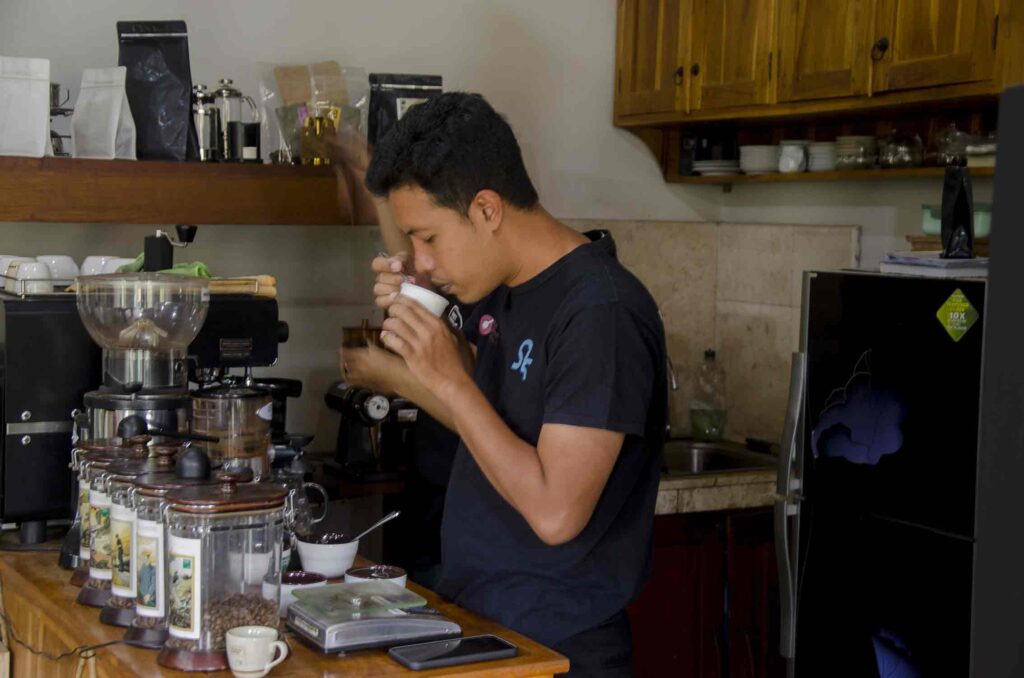
Arya Giri this time moved behind the bar table, starting to get busy with his manual grinder and brewing equipment. He was preparing to taste the coffee from his sample roasting earlier.
According to him, the situation in the diverse coffee plantations is that many are not understood by the middle and upstream parts of the coffee industry supply chain.
“Roasteries or coffee shops only demand the best quality Balinese coffee beans and often ask for the cheapest price. But they never come to see the plantation situation,” he complained bitterly.
There is a broken story in the enjoyment of Balinese specialty coffee if roasters and baristas in coffee shops do not understand the situation of coffee plantations in Bali.
The empty space will be filled with nonsense just to build a fake story that is certainly not honest with consumers. Or being silent when asked how the specialty coffee that is served is produced.
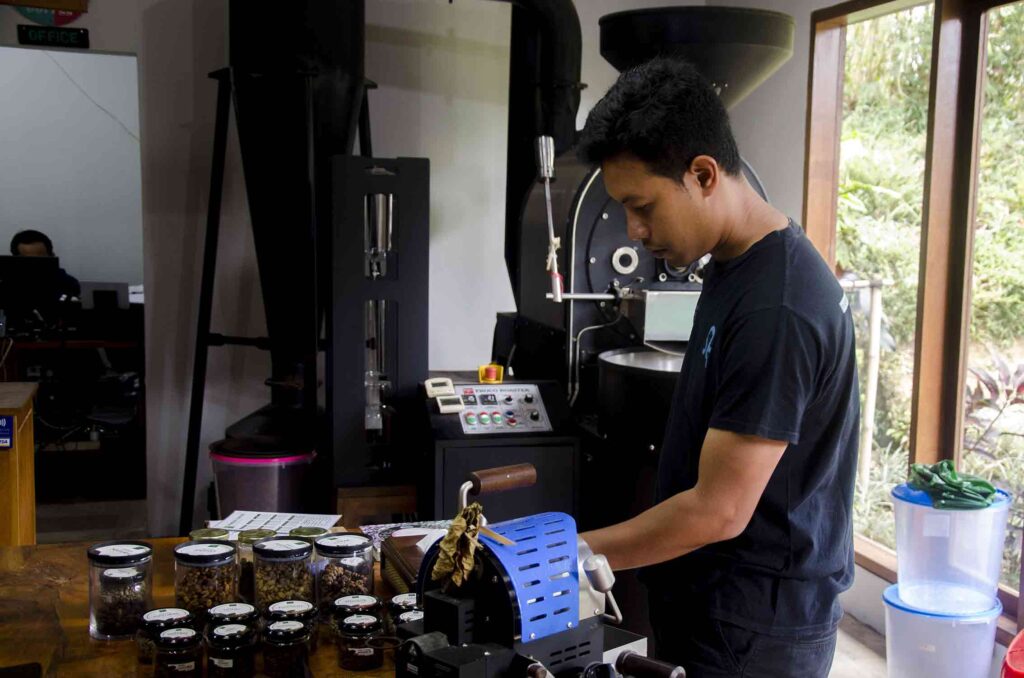
Starting out working as a barista and bartender at Hardrock Café in the Kuta area in 2012. At that time, not many coffee shops knew about specialty coffee.
He is considered a senior coffee worker in Bali. Until the COVID-19 pandemic era forced him to return to his hometown in Munduk, Bangli.
The pandemic situation actually found momentum for the coffee business to soar. Arya Giri moved to work at Munduk Coffee Roasters, which is not far from his home.
At this workplace, he has to process coffee cherries from around 2 hectares of coffee land and 100 coffee farmers in Munduk and its surroundings.
No less than 100 tons of coffee cherries are processed every year.
He is a fairly rare coffee worker because he has knowledge from upstream to downstream. But also has direct experience interacting with farmers, coffee processors, roasters, and coffee drinkers.
Having been actively working in the coffee world for so long, it is no wonder that Arya Giri is often trusted as a judge in various coffee competitions.
Many coffee competition participants do not recognize how quality coffee is produced. They only know that there is good coffee in front of them.
According to him, by knowing where the coffee is produced and how the coffee is planted and cared for by farmers with hard work, baristas will appreciate coffee more than just as a commodity.
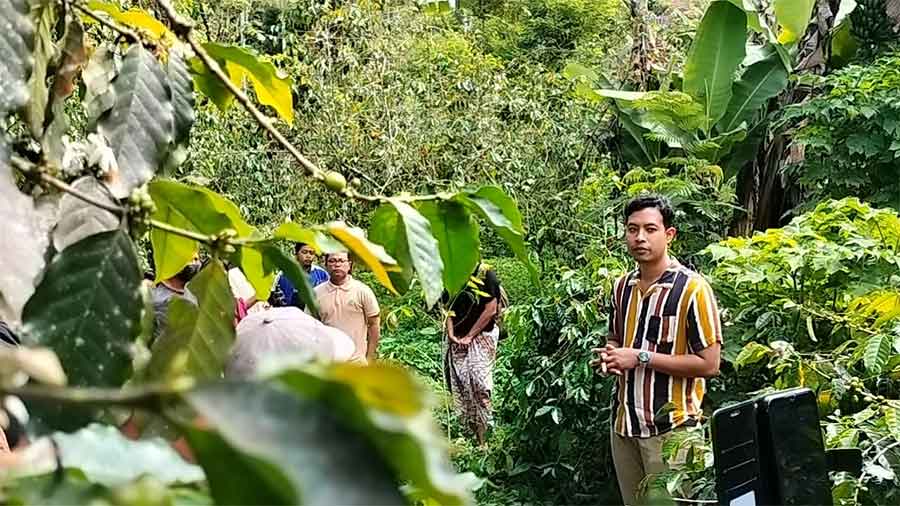
Balinese coffee needs serious efforts to be better. There must be serious research related to superior varieties that are most suitable for the fairly varied plantation land conditions in Bali. It will indeed be a long research process, but at least it must be started and continued.
Coffee farmers who regularly submit their harvest to Munduk Coffee generally have a land area of less than 1 hectare. Even only around 10 are. This often makes coffee farmers unable to rely on living only from the coffee harvest.
“Only farmers who already have good economic capabilities can really manage their coffee plantations optimally,” he said.
So the government needs to play a role in taking real action for coffee farmers, especially those who still do not have sufficient capabilities in growing coffee properly.
“The government should not just take care of unimportant things; that won’t work either,” he said with a sad laugh.
Efforts to increase Balinese coffee production by hoping that farmers will expand their plantations are clearly far from the mark. The skyrocketing land prices, coupled with the increasing number of villas and residential buildings being built on productive land that seems unstoppable, are clearly putting more pressure on the existence of farmers.
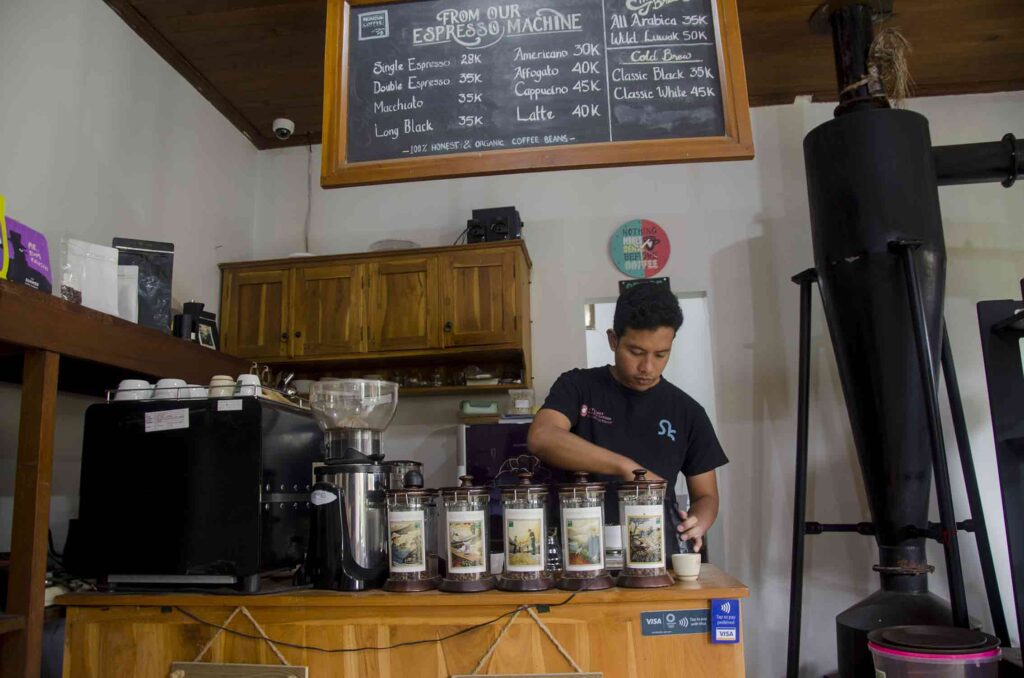
However, Arya Giri is not willing to just sit idly by. He shows his support for farmers by remaining loyal to guarding and accepting their coffee harvests and processing them as well as possible. Because he is aware, as a coffee processor, his role in the supply chain of the Bali Specialty coffee industry can be as a quality guard on the upstream side.
Arya Giri suppresses ego that often demands an ideal situation; Arya Giri chooses to maximize what is available for the progress of Bali Coffee and its farmers.
Follow Arya Giri on his social media accounts:

